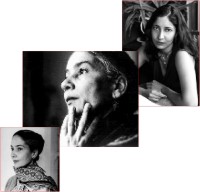| Author Profile
Anita Desai
Novelist, short-story writer and children's author Anita Desai was born in 1937 in Mussoorie, India. She was educated at Delhi University.
Anita Desai lives in the United States, where she is the John E. Burchard Professor of Writing at Massachusetts Institute of Technology, Cambridge, MA.
 Genres (in alphabetical order) Genres (in alphabetical order)
Children, Fiction, Short stories
Bibliography
Cry, The Peacock Peter Owen, 1963
Voices in the City Peter Owen, 1965
Where Shall We Go This Summer? Vikas (New Delhi), 1975
Fire on the Mountain Heinemann, 1977
Games at Twilight and Other Stories Heinemann, 1978
The Peacock Garden (illustrated by Jeroo Roy) Heinemann, 1979
Clear Light of Day Heinemann, 1980
The Village By the Sea Heinemann, 1982
In Custody Heinemann, 1984
Baumgartner's Bombay Heinemann, 1987
Journey to Ithaca Heinemann, 1995
Fasting, Feasting Chatto & Windus, 1999
Diamond Dust and Other Stories Chatto & Windus, 2000
The Zig Zag Way Chatto & Windus, 2004
Prizes and awards
1978 National Academy of Letters Award Fire on the Mountain
1978 Winifred Holtby Memorial Prize Fire on the Mountain
1980 Booker Prize for Fiction (shortlist) Clear Light of Day
1983 Guardian Children's Fiction Prize The Village by the Sea
1984 Booker Prize for Fiction (shortlist) In Custody
1993 Neil Gunn Prize
1999 Booker Prize for Fiction (shortlist) Fasting, Feasting
2000 Alberto Moravia Prize for Literature (Italy)
Anita Desai confesses that while she 'feels about India as an Indian,' she thinks about it 'as an outsider'. Desai probably derived this point of view from her German mother, whom she aptly describes as carrying 'a European core in her which protested against certain Indian things, which always maintained its independence and its separateness.' Her oeuvre has explored the lives of outsiders within Indian society and, more recently, also within the West. Her fiction has covered themes such as women's oppression and quest for a fulfilling identity, family relationship and contrasts, the crumbling of traditions, and anti-Semitism. The Eurocentric and social biases that are sometimes detected in her fiction, therefore, may be more productively read as the result of the author's focus on uprooted and marginalized identities.
Desai's novels and short-stories evoke characters, events and moods with recourse to a rich use of visual imagery and details, which has led to comparisons with the modernist sensibilities of T. S. Eliot, William Faulkner and Virginia Woolf.
As Desai herself admits, her novels are not populated by heroic characters, whether male or female, at least in the traditional sense. Her protagonists are marked by a certain passivity and have been criticised as being swept away by historical and social forces rather than being able to face and control them. Yet, Desai claims that 'my characters who appear like losers, victims show a kind of heroism, of survival. I think if you can come through the experience of life with the heart and mind intact, without compromising yourself, that to me is a heroic act that needs to be celebrated.'
Whether Desai's characters live on the banks of the Ganges or amidst the excesses of Massachusetts, they cannot find meaningful personal relationships other than with their own solitude.
Copyright
(R) thedailystar.net 2007 |
